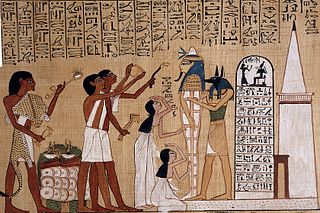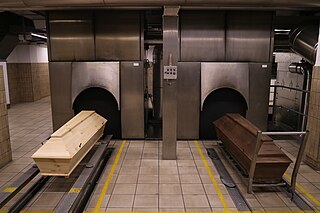Related Research Articles

A funeral is a ceremony connected with the final disposition of a corpse, such as a burial or cremation, with the attendant observances. Funerary customs comprise the complex of beliefs and practices used by a culture to remember and respect the dead, from interment, to various monuments, prayers, and rituals undertaken in their honor. Customs vary between cultures and religious groups. Funerals have both normative and legal components. Common secular motivations for funerals include mourning the deceased, celebrating their life, and offering support and sympathy to the bereaved; additionally, funerals may have religious aspects that are intended to help the soul of the deceased reach the afterlife, resurrection or reincarnation.

Service Corporation International is an American provider of funeral goods and services as well as cemetery property and services. It is headquartered in Neartown, Houston, Texas, and operates secondary corporate offices in Jefferson, Louisiana. SCI operates more than 1500 funeral homes and 400 cemeteries.

Cremation is a method of final disposition of a dead body through burning.

Burial, also known as interment or inhumation, is a method of final disposition whereby a dead body is placed into the ground, sometimes with objects. This is usually accomplished by excavating a pit or trench, placing the deceased and objects in it, and covering it over. A funeral is a ceremony that accompanies the final disposition. Evidence suggests that some archaic and early modern humans buried their dead. Burial is often seen as indicating respect for the dead. It has been used to prevent the odor of decay, to give family members closure and prevent them from witnessing the decomposition of their loved ones, and in many cultures it has been seen as a necessary step for the deceased to enter the afterlife or to give back to the cycle of life.

A morgue or mortuary is a place used for the storage of human corpses awaiting identification (ID), removal for autopsy, respectful burial, cremation or other methods of disposal. In modern times, corpses have customarily been refrigerated to delay decomposition.

The Confederation of British Industry (CBI) is a British business interest group, which says it represents 190,000 businesses. The CBI has been described by the Financial Times as "Britain's biggest business lobby group". Incorporated by royal charter, its mission is to promote the conditions in which businesses of all sizes and sectors in the UK can compete and prosper for the benefit of all. In 2023, the association was shaken by numerous accusations of sexual misconduct in the organisation.

Natural burial is the interment of the body of a dead person in the soil in a manner that does not inhibit decomposition but allows the body to be naturally recycled. It is an alternative to typical contemporary Western burial methods and modern funerary customs.

Cremation is a method used to dispose of the deceased in the Christian world despite historical opposition to the practice.

Deaths in Singapore offset the population increase from live births. In 2007, 17,140 people in Singapore died from various causes. The death rate was 4.5 deaths per 1,000 of the population. There are strict regulations surrounding death and treatment of the body after death.

The Babaoshan Revolutionary Cemetery is Beijing's main resting place for the highest-ranking revolutionary heroes, high government officials and, in recent years, individuals deemed of major importance due to their contributions to society. In Chinese, Babaoshan literally means "The Eight-Treasure Mountains". The cemetery is located in Babaoshan Subdistrict, Shijingshan District, in western Beijing Municipality.
Icelandic funerals are ceremonies that are largely shaped by the Evangelical Lutheran Church of Iceland, the largest Christian organisation in Iceland. However, customs may vary depending on religious group.
Among Buddhists, death is regarded as one of the occasions of major religious significance, both for the deceased and for the survivors. For the deceased, it marks the moment when the transition begins to a new mode of existence within the round of rebirths. When death occurs, all the karmic forces that the dead person accumulated during the course of their lifetime become activated and determine the next rebirth. For the living, death is a powerful reminder of the Buddha's teaching on impermanence; it also provides an opportunity to assist the deceased person as they transition to a new existence. There are several academic reviews of this subject. In Buddhism, death marks the transition from this life to the next for the deceased.
The death care industry in the United States includes companies and organizations that provide services related to death: funerals, cremation or burial, and memorials. This includes for example funeral homes, coffins, crematoria, cemeteries, and headstones. The death care industry within the U.S. consists mainly of small businesses, although there has been considerable consolidation over time.
Dignity plc is a funeral-related service provider in the United Kingdom, and the only publicly listed company within the country's funeral sector.

Deathcare is the planning, provision, and improvement of post-death services, products, policy, and governance. Here, deathcare functions to describe the industry of deathcare workers, the policy and politics surrounding deathcare provision, and as an interdisciplinary field of academic study.
Women have had varying roles in the death care industry in the United States since its mid-nineteenth century inception.
Allison Joan McGeer is a Canadian infectious disease specialist in the Sinai Health System, and a professor in the Department of Laboratory Medicine and Pathobiology at the University of Toronto. She also appointed at the Dalla Lana School of Public Health and a Senior Clinician Scientist at the Lunenfeld-Tanenbaum Research Institute, and is a partner of the National Collaborating Centre for Infectious Diseases. McGeer has led investigations into the severe acute respiratory syndrome outbreak in Toronto and worked alongside Donald Low. During the COVID-19 pandemic, McGeer has studied how SARS-CoV-2 survives in the air and has served on several provincial committees advising aspects of the Government of Ontario's pandemic response.

Farewill is a private company that provides will-writing, probate, and cremation services in the UK, based in London. Founded in 2015. It claims to be the UK's biggest will writer. Farewill is registered in England and Wales with the Law Society and was declared the National Will Writing Firm of the year in 2019.
The National Association of Funeral Directors is based in Solihull, England. Established in 1905, the National Association of Funeral Directors represents funeral directing businesses in the United Kingdom; including independent and family owned firms, co-operatives and major funeral groups.
References
- ↑ "Home". dmag2020.org. Retrieved 2022-05-04.
- ↑ "[Withdrawn] Guidance for care of the deceased with suspected or confirmed coronavirus (COVID-19)". GOV.UK. April 2022. Retrieved 2022-05-04.
- ↑ https://questions-statements.parliament.uk/written-questions/detail/2021-03-02/161671/.
{{cite web}}: Missing or empty|title=(help)